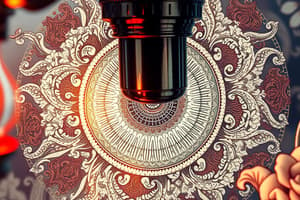Podcast
Questions and Answers
What is the primary effect of aberration in optical systems?
What is the primary effect of aberration in optical systems?
- Enhanced image resolution
- Blurring of the image (correct)
- Increased color saturation
- Reduction of light intensity
How does aberration occur during light transmission?
How does aberration occur during light transmission?
- Light is reflected rather than transmitted
- Light from multiple points converges
- Light is absorbed by the optical system
- Light from one point reaches different points (correct)
Why is it important for instrument-makers to address aberration?
Why is it important for instrument-makers to address aberration?
- To correct optical systems for clearer images (correct)
- To reduce the weight of optical devices
- To enhance the brightness of the image
- To improve the mechanical structure
What kind of images does aberration typically produce?
What kind of images does aberration typically produce?
Which of the following best describes the nature of aberration?
Which of the following best describes the nature of aberration?
What does the appearance of halos after corneal refractive surgery indicate?
What does the appearance of halos after corneal refractive surgery indicate?
Which of the following visual complaints is commonly reported after corneal refractive surgery?
Which of the following visual complaints is commonly reported after corneal refractive surgery?
What type of visual disturbances can result from corneal refractive surgery?
What type of visual disturbances can result from corneal refractive surgery?
What complication may result from the induction of optical aberrations after surgery?
What complication may result from the induction of optical aberrations after surgery?
Which of the following is NOT typically associated with visual complaints after corneal refractive surgery?
Which of the following is NOT typically associated with visual complaints after corneal refractive surgery?
What is the main reason spherical lenses are commonly used despite their shortcomings?
What is the main reason spherical lenses are commonly used despite their shortcomings?
What does spherical aberration result from?
What does spherical aberration result from?
Which of the following statements is true regarding spherical aberration?
Which of the following statements is true regarding spherical aberration?
Why are other lens shapes not used as frequently as spherical lenses?
Why are other lens shapes not used as frequently as spherical lenses?
What factor makes spherical surfaces a popular choice for lens design?
What factor makes spherical surfaces a popular choice for lens design?
What characteristic differentiates aspheric lenses from traditional lenses?
What characteristic differentiates aspheric lenses from traditional lenses?
How do aspheric lenses affect spherical aberration?
How do aspheric lenses affect spherical aberration?
Which of the following statements about aspheric lenses is true?
Which of the following statements about aspheric lenses is true?
Why are aspheric lenses favored in optical systems?
Why are aspheric lenses favored in optical systems?
What is a primary advantage of using aspheric lenses over spherical lenses?
What is a primary advantage of using aspheric lenses over spherical lenses?
What is one method to minimize spherical aberration in optical systems?
What is one method to minimize spherical aberration in optical systems?
Which option describes the function of a 'stop' in the context of minimizing spherical aberration?
Which option describes the function of a 'stop' in the context of minimizing spherical aberration?
In which scenario would aspheric lenses be preferred over traditional spherical lenses?
In which scenario would aspheric lenses be preferred over traditional spherical lenses?
What is a potential drawback of using a stop in front of the lens?
What is a potential drawback of using a stop in front of the lens?
Why is it important to address spherical aberration in optical systems?
Why is it important to address spherical aberration in optical systems?
Flashcards are hidden until you start studying
Study Notes
Aberration
- Aberration is a phenomenon that causes image blurring
- It occurs when light from a single point of an object reaches different points after passing through an optical system
- Optical systems are designed to correct for aberration
- Aberration can lead to visual complaints like halos, glare, and monocular diplopia
- These visual complaints occur after corneal refractive surgery
Spherical Aberration
- Spherical aberration occurs because spherical surfaces are not the ideal shape for lenses, but they are the easiest to manufacture
- Aspheric lenses have non-spherical surfaces and are better at minimizing spherical aberration
- Aspheric lenses have less peripheral curvature compared to central curvature
- Placing a "stop" in front of a lens, like an Iris, can minimize Spherical aberration
Studying That Suits You
Use AI to generate personalized quizzes and flashcards to suit your learning preferences.




